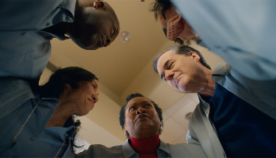About Us


Williams v. Washington, Alabama Secretary of Labor, No. 23-191, 144 S. Ct. 679 (2024).
Decision below: Johnson v. Alabama Sec’y of Lab., SC-2022-0897, 2023 WL 4281620 (Ala. June 30, 2023).
Oral argument is scheduled for October 7, 2024.
Issue: Whether plaintiffs must exhaust administrative remedies before bringing claims under Section 1983 of the Civil Rights Act of 1871, 42 U.S.C. § 1983, in state court.
During this post-Civil War era, Black Americans frequently experienced civil rights abuses due to the continued presence of the Ku Klux Klan within state and local governments. Section 1983 of the Civil Rights Act of 1871 provided a mechanism for victims of civil rights abuses to seek compensation from state and local governments that violate their rights. Notably, Section 1983 does not require a civil rights victim to “administratively exhaust” a state’s internal processes for dealing with civil rights abuse allegations before filing a lawsuit in federal court; instead, victims can sue a state government in federal court without having to address their grievances through existing, state resolution processes. When a person acting under color of law, often a government official, violates another person’s constitutional or statutory rights, Section 1983 provides a way for the victim’s civil lawsuit to proceed in federal court. 42 U.S.C. § 1983; see also Hafer v. Melo, 502 U.S. 21 (1991) (holding state officers may be held personally liable under § 1983 based upon actions taken in their official capacities).
Plaintiff Nancy Williams and 21 other Alabama residents filed unemployment compensation claims with the Alabama Department of Labor. Petition for Writ of Certiorari at i, ii, 2, Williams v. Washington, 144 S. Ct. 679 (2024) (No. 23-191). After enduring extremely lengthy processing times, Plaintiffs filed a Section 1983 lawsuit in the Montgomery County Circuit Court. Johnson v. Alabama Sec’y of Lab. Fitzgerald Washington, SC-2022-0897, 2023 WL 4281620, at *1 (Ala. June 30, 2023). Plaintiffs specifically requested that the court direct the state labor department to promptly make decisions for the residents’ applications and schedule the requested hearings. Id. The Montgomery County Circuit Court dismissed their case without a written opinion. Petition for Writ of Certiorari at 27a-28a, Williams v. Washington, 144 S. Ct. 679 (No. 23-191). The Supreme Court of Alabama affirmed the dismissal because Plaintiffs had not “exhausted” their administrative remedies by first going through Alabama’s state administrative appeal process. Johnson, 2023 WL 4281620, at *4.
According to Plaintiffs, the case dismissal contradicts the Supreme Court’s holding in Patsy v. Boards of Regents and cases in other high state courts. 457 U.S. 496, 516 (1982). In Patsy, a job applicant with a state university sued under Section 1983, alleging that the employer had not hired her because of her race and sex. Id. at 498. The Court held that going through a state administrative appeals process is unnecessary to bring a Section 1983 claim in federal court. Id. at 516. Although Patsy involved a dispute filed in federal court, Plaintiffs argue that the decision is grounded in the history of federal civil rights laws and is not limited to federal courts. As such, Patsy’s “no exhaustion requirement” also applies to actions filed in state court. Petition for Writ of Certiorari at 13-14, Williams, 144 S. Ct. 679 (No. 23-191).
Plaintiffs also claim that the Supreme Court’s decision in Felder v. Casey further confirms that Patsy’s no-exhaustion rule applies in state court. 487 U.S. 131 (1988). In Felder, the Court highlighted that the “central purpose of the Reconstruction-Era laws is to provide compensatory relief to those deprived of their federal rights by state actors.” Id. at 141. Cases from the highest courts of states like Montana, Connecticut, Alaska, Kansas, and Colorado (among others) have also upheld the no-exhaustion rule for Section 1983 claims filed in state court. Petition for Writ of Certiorari at 19-20, Williams, 144 S. Ct. 679 (No. 23-191).
Defendant Alabama Secretary of Labor disagrees with Plaintiffs’ arguments, which leaves the final decision with the Supreme Court.
WHAT’S AT STAKE
If the Supreme Court upholds the Alabama Supreme Court’s ruling, then state courts will be able to dismiss Section 1983 claims that have not first gone through every step of every available administrative grievance process, even if the dysfunction of those processes is part of the lawsuit. This would be significant for the thousands of Americans, including older adults, who sue for rights violations under Section 1983. For example, just last year the Court made clear that actions under Section 1983 allow older adults to sue for violations of rights guaranteed under the Nursing Home Reform Act, in a case in which AARP filed an amicus brief. Health & Hosp. Corp. of Marion Cnty. v. Talevski, 599 U.S. 166 (2023).
Moreover, litigation is already a lengthy process, and a ruling that further prolongs the time it takes to file a lawsuit under Section 1983 by years or indefinitely could deter potential litigants from filing Section 1983 claims in state courts altogether. Although claimants could file a Section 1983 claim in federal court without exhausting administrative remedies, the public’s access to the courts would be hindered by foreclosing a state court action. This would require plaintiffs in Section 1983 cases to endure violations of constitutional rights or other laws—while trying to address these violations through state administrative systems—before they could file a lawsuit in state court. If the Court rules in favor of Plaintiffs, then individuals can more quickly and effectively seek redress for alleged civil rights violations in state courts.
Sam Wehrle, SWehrle@aarp.org
View the Full Supreme Court Preview

















